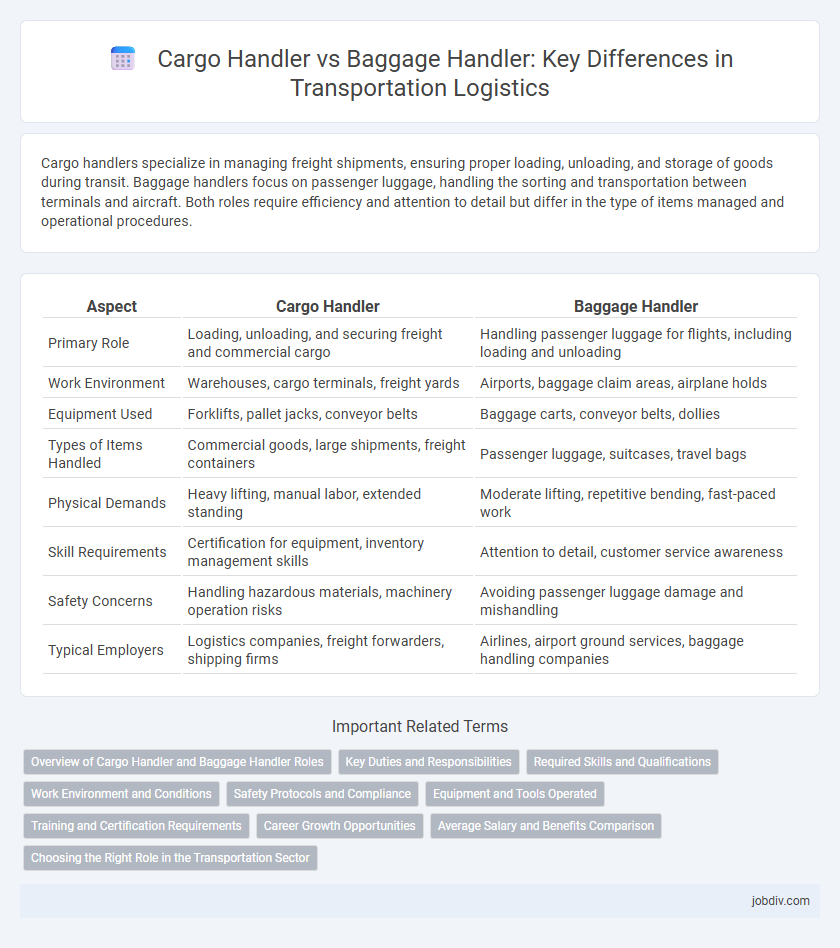Cargo handlers specialize in managing freight shipments, ensuring proper loading, unloading, and storage of goods during transit. Baggage handlers focus on passenger luggage, handling the sorting and transportation between terminals and aircraft. Both roles require efficiency and attention to detail but differ in the type of items managed and operational procedures.
Table of Comparison
| Aspect | Cargo Handler | Baggage Handler |
|---|---|---|
| Primary Role | Loading, unloading, and securing freight and commercial cargo | Handling passenger luggage for flights, including loading and unloading |
| Work Environment | Warehouses, cargo terminals, freight yards | Airports, baggage claim areas, airplane holds |
| Equipment Used | Forklifts, pallet jacks, conveyor belts | Baggage carts, conveyor belts, dollies |
| Types of Items Handled | Commercial goods, large shipments, freight containers | Passenger luggage, suitcases, travel bags |
| Physical Demands | Heavy lifting, manual labor, extended standing | Moderate lifting, repetitive bending, fast-paced work |
| Skill Requirements | Certification for equipment, inventory management skills | Attention to detail, customer service awareness |
| Safety Concerns | Handling hazardous materials, machinery operation risks | Avoiding passenger luggage damage and mishandling |
| Typical Employers | Logistics companies, freight forwarders, shipping firms | Airlines, airport ground services, baggage handling companies |
Overview of Cargo Handler and Baggage Handler Roles
Cargo handlers manage the loading, unloading, and storage of freight and shipments in warehouses, ensuring accurate inventory control and adherence to safety protocols. Baggage handlers specialize in the efficient movement and handling of passenger luggage at airports, coordinating with airlines to maintain timely boarding processes. Both roles require physical stamina and attention to detail but differ primarily in their focus on commercial cargo versus passenger baggage operations.
Key Duties and Responsibilities
Cargo Handlers manage the loading, unloading, and securing of freight shipments, ensuring proper documentation and compliance with safety regulations. Baggage Handlers focus on transporting passenger luggage between terminals and aircraft, maintaining accurate tracking and preventing damage. Both roles require coordination with airline staff and adherence to airport security protocols.
Required Skills and Qualifications
Cargo handlers require strong physical stamina, attention to safety protocols, and knowledge of loading equipment and inventory management systems. Baggage handlers need efficient time management skills, ability to operate baggage handling systems, and customer service awareness to ensure smooth airport operations. Both roles demand teamwork, reliability, and compliance with aviation security standards.
Work Environment and Conditions
Cargo handlers typically work in large warehouses, shipping docks, or freight terminals where they load, unload, and manage diverse cargo types, often in demanding physical conditions with exposure to varying weather elements. Baggage handlers operate mainly at airports, dealing with passenger luggage on tight schedules, requiring them to work in potentially noisy environments around aircraft and conveyor systems. Both roles demand physical stamina and adherence to safety protocols, but cargo handlers may face heavier loads and outdoor elements more frequently than baggage handlers.
Safety Protocols and Compliance
Cargo handlers and baggage handlers follow strict safety protocols to prevent injuries and ensure compliance with aviation regulations such as OSHA and FAA standards. Cargo handlers typically manage heavier, bulkier shipments requiring specialized equipment and training in hazardous materials handling, while baggage handlers focus on efficiently moving passenger luggage with attention to secure loading and minimizing damage. Both roles mandate the use of personal protective equipment (PPE), adherence to workplace safety rules, and regular safety audits to maintain operational compliance and reduce workplace incidents.
Equipment and Tools Operated
Cargo handlers primarily operate heavy machinery such as forklifts, pallet jacks, conveyor belts, and cranes to load, unload, and move large freight shipments efficiently. Baggage handlers use specialized equipment including baggage carts, conveyor systems, belt loaders, and container loaders designed specifically for managing passenger luggage safely and quickly. Both roles require proficiency with tracking devices and safety tools to ensure secure handling and accurate delivery throughout transportation processes.
Training and Certification Requirements
Cargo handlers require specialized training in hazardous materials handling, load securing techniques, and forklift operation, often necessitating certifications such as OSHA HAZWOPER and forklift licenses. Baggage handlers prioritize training in baggage screening protocols, customer service, and safety procedures, with certifications like TSA security clearance being essential for airport access. Both roles demand compliance with airline and federal regulations, yet cargo handlers undergo more rigorous safety and technical certification processes.
Career Growth Opportunities
Cargo handlers often experience broader career growth due to their involvement in logistics, inventory management, and heavy machinery operation, opening pathways to supervisory and managerial roles. Baggage handlers primarily focus on passenger service efficiency and may advance within airport operations or customer service sectors. Both career paths provide foundational skills, but cargo handling tends to offer more diverse opportunities in supply chain management and transportation logistics.
Average Salary and Benefits Comparison
Cargo handlers typically earn an average salary of $38,000 to $45,000 annually, while baggage handlers' salaries range from $30,000 to $40,000. Benefits for cargo handlers often include health insurance, retirement plans, and overtime pay, reflecting the physically demanding nature of the job. Baggage handlers also receive similar benefits but may have less access to overtime opportunities due to more standardized shifts.
Choosing the Right Role in the Transportation Sector
Cargo handlers specialize in managing freight shipments, ensuring secure loading and unloading of goods in warehouses and transportation vehicles. Baggage handlers focus on passenger luggage, handling sorting, loading, and unloading at airports with strict attention to fragile and time-sensitive items. Choosing the right role depends on your preference for freight logistics versus airport passenger service and requires specific skills aligned with the transportation sector's operational demands.
Cargo Handler vs Baggage Handler Infographic

 jobdiv.com
jobdiv.com